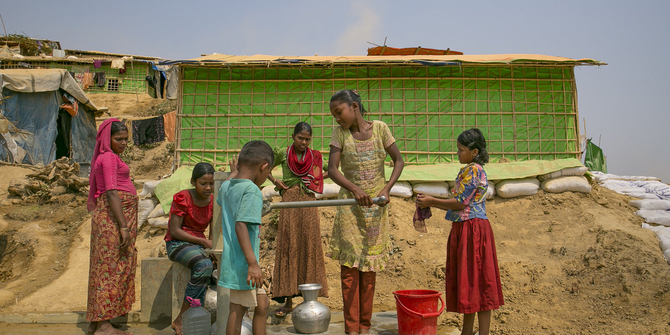Following their escape from Myanmar’s violent military campaign in 2017, thousands of Rohingya children now call refugee camps in Bangladesh home. In a bid to understand the scale of the mental health crisis they face, a team of health professionals completed 622 screenings of displaced Rohingya children in January 2018. Naila Z. Khan (Bangladesh Protibondhi Foundation) and Helen McConachie (Newcastle University) explain what the team found.
The 2017 political violence against the Rohingya people in the state of Rakhine, Myanmar, resulted in a large influx of displaced populations into Bangladesh from November. Given the harsh conditions and experiences in Myanmar, and the harrowing journey to the border raised levels of child neurodevelopmental disorders, child mental health problems were expected.
Within Bangladesh, a network of child development centres provides services to families and children. Many are based in Medical College Hospitals, which cater for the poorest of poor families. The team based in Cox’s Bazar, close to the refugee camps, and supported by additional experienced physicians, therapists and psychologists from Dhaka, worked with the Directorate General of Health Services, Government of Bangladesh, to provide an emergency service from January 2018.
It is, of course, known that children escaping political violence are likely to be vulnerable. Our findings from refugee camps in Bangladesh, however, provide early objective evidence concerning recently displaced children.
Screening 622 children with the help of Rohingya block leaders
The team of child development professionals (physicians, psychologists and developmental therapists) screened 622 children in clinics within the refugee camps. Each day the Rohingya majhis (block leaders) were asked to announce by loud-speaker that the child development team was present, and could see any child from 0-16 years. Mothers or the primary care-providers were encouraged to bring these children to the clinic for a preliminary checkup. The majhis were also asked, as key informants, that if they knew of children with any kind of developmental concerns related to their physical, sensory, behavioral, cognitive or emotional development, or any child without a parent, these children should be brought in to the clinic.
The team used validated tools: the Developmental Screening Questionnaire (DSQ; 0-<2 years), and the Ten Questions Plus (TQP; 2-16 years) for neurodevelopmental disorders, and the Strengths and Difficulties Questionnaire (SDQ; 2-16 years) for mental health problems. For the SDQ, the abnormal percentage is expected to be 10% in the general population. Both child health physicians understood Rohingya dialect and could explain the meaning of terms within the screening tools where necessary. Any child positive on the DSQ or the TQP was assessed further for their health, growth and type of disorders.

Biggest risk factor: parent-less children
Despite expectations, only 4.8% children aged 0-<2 years and 7.3% children aged >2-16 years screened positive for neurodevelopmental disorders, the rate comparable to a local Bangladesh population. However, 52% of children were found to be reported in the abnormal range for emotional symptoms on the Strengths and Difficulties Questionnaire; of the individual emotional symptoms items, the most endorsed as ‘certainly true’ were ‘many worries’ for 30.7% and ‘often unhappy, downhearted’ for 23.8% of the children screened. Twenty five percent of children screened were reported in the abnormal range for peer problems. Significant risk factors for raised mental health problems were being parent-less (100% of parent-less children were reported in the abnormal range for emotional symptoms versus 57.8% who were with parents) and having lost one or more family members in the recent crisis.
The study is not a prevalence study, given the emergency situation with continuing new arrivals into the camps; thus the true denominator is not known. The recruitment strategy of announcements by loudspeaker by the Rohingya community leaders, along with more focused seeking out of children with developmental problems, was feasible in the situation, but it cannot be known whether sufficient trust was established to make the screened sample representative. Nevertheless, the mental health screening results do point towards the scale of the problems for the children in this emergency situation.
The study team were struck by the resilience of the Rohingya mothers and care-providers, as they and the children attended the clinic well-groomed despite their difficult living circumstances. The deprivation of the population while in Myanmar was evident from the low levels of formal education of adults and poor housing reported. The mental health of the parents and care-providers was not assessed, but studies of previous waves of Rohingya refugees suggest high levels of adult mental health problems including post-traumatic stress disorder and depression.
These findings from this screening study of recently displaced Rohingya children indicate that, as well as urgent needs for shelter, food and preventive healthcare, children require immediate psychosocial support in emergency situations. A number of organisations have taken account of these needs, with mental health training of staff working with children, provision of child-friendly spaces, and monitoring of children’s well-being, along with counseling of families and other care-providers. Given the extent of the emotional needs, universal initiatives to build children’s and adults’ skills, confidence and self-esteem are needed, including through dance, music and other cultural initiatives.
This blog has been adapted from an article published on 18 October 2018 in Child: Care, Health and Development.
This article gives the views of the authors, and not the position of the South Asia @ LSE blog, nor of the London School of Economics. Please read our comments policy before posting.
Naila Z. Khan is Professor of Child Neurology and Development and Director, Clinical Neurosciences Unit, Bangladesh Protibondhi Foundation, Dhaka, Bangladesh.
Helen McConachie is Emerita Professor of Child Clinical Psychology at Institute of Health and Society, Newcastle University, UK.






